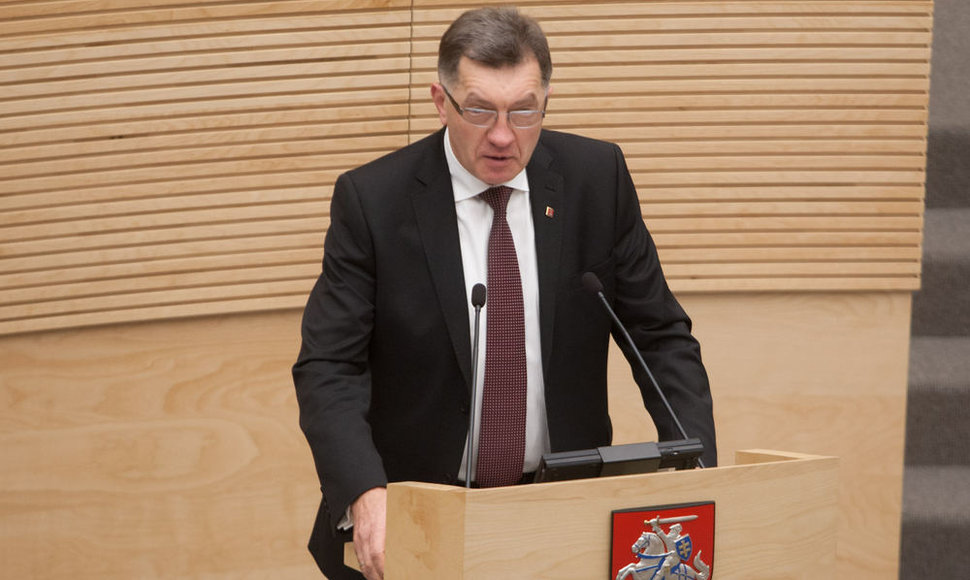According to the Lithuanian Constitution, the prime minister is appointed and dismissed by the president with endorsement from parliament. Under the Seimas statute, after receiving the presidential proposition, parliament gives the president an opportunity to present the candidate at the nearest meeting. Once the candidate has been presented, he makes a speech and later answers questions from MPs. The nomination is then discussed by political groups for up to two days.
The president may recall the presented candidate at any time before the vote of approval.
Born in Radviliškis district, northern Lithuania, on 19 November 1958, Butkevičius graduated from Šeduva Secondary School in 1977 and acquired a degree in economic engineering at Vilnius Institute of Engineering Construction (now – Vilnius Gediminas Technical University) in 1984. In 1990-1991, he studied at the Lithuanian Academy of Management and graduated with a qualification of manager. He was enrolled in postgraduate management studies at Kaunas University of Technology in 1995.
The PM nominee has been on internships in Germany, the United States, and Denmark. In 2008, he defended a doctoral thesis in social sciences.
He started his professional career in Vilkaviškis in 1982, served as an architecture inspector in Vilkaviškis in 1985-1990, was deputy manager of Vilkaviškis district in 1991-1995 and was the director for market research and marketing at Vilkauta company in 1995-1996.
Butkevičius has been member of the Lithuanian Seimas since 1996. He was the finance minister in 2004–2005 and the minister of transport and communications in 2006-2008.
President expects integrity
President Grybauskaitė, presenting the nomination, said she was convinced the country's stability would benefit from Butkevičius' experience.
"I have had an opportunity to personally work with the candidate for prime minister, as he headed the Seimas Budget and Finance Committee during my term as finance minister. I have no doubts that the politician's experience will be beneficial in ensuring economic and financial stability of the state," Grybauskaitė addressing parliament.
The president said she expected the future prime minister to propose candidates for ministers who would raise no moral or professional doubts.
"A political disguise for a party on trial and its members would make hostages of the Social Democrats and the rest of the state. Therefore, I hope that Butkevičius will have enough integrity, personal and business-like qualities to propose only those individuals who raise no moral or professional doubts," the president noted.
Grybauskaitė emphasized that the choice made by the Social Democratic Party between transparent and responsible policies and identification with the party on trial would be crucial for everyone, adding that the first test would be the ballot on stripping the MPs on trial of their legal immunity.
Education of minorities
Responding to parliament questions, Butkevičius said that the date of enforcement of some of the provision of the Education Law in connection to national minorities would be postponed.
"The time-frame for enforcement of some articles of the law will be extended," Butkevičius said at parliament on Tuesday when asked about changes to the Education Law concerning the education of national minorities.
Asked about whether the Electoral Action of Poles in Lithuania made demands about national minority education during coalition talks, Butkevičius said that changes to the Education Law were necessary in any case.
In spring 2011, the parliament passed a new Education Law, which, among other things, envisaged a new procedure of teaching of the Lithuanian language in schools of national minorities, i.e., more classes in the official Lithuanian language and unified Lithuanian-language examination as of 2013. The changes drew heated reactions from some representatives of national minorities.
Biofuel is key
Butkevičius identified the development of biofuel segment as a national priority for Lithuania’s energy industry.
The government under his leadership would also support the construction of electricity links with Sweden and Poland and the building of a liquefied natural gas (LNG) terminal in the port of Klaipėda.
“It [biofuel] is Lithuania’s internal resource, which we will use to enhance the diversity of energy resources, to prevent capital outflows and to create at least 20,000 jobs,” Butkevičius told the MPs on Tuesday.
“Large projects shall be subject to the common Baltic energy strategy so as to get the European Union’s (EU) support. Hence we will continue to support efforts to create a common Baltic electricity market and to build links with Sweden and Poland,” he said.
Referring to the gas sector, Butkevičius spoke about the necessity to improve the diversity of supply and to reduce dependence on a single gas supplier. “Hence the priorities include the construction of the liquefied natural gas terminal,” he said.












